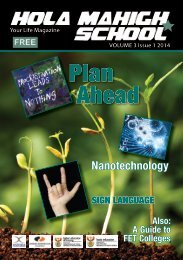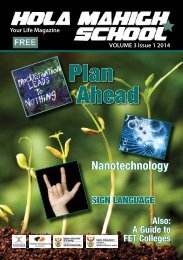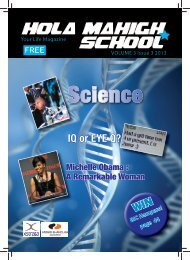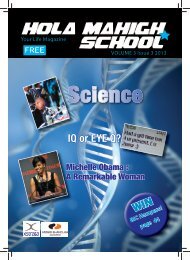Open-Day – get there!
You also want an ePaper? Increase the reach of your titles
YUMPU automatically turns print PDFs into web optimized ePapers that Google loves.
Science<br />
According to Wikipedia, 90% of all mealies grown in<br />
the US are GMO. 90% of all soybeans and 45% of all<br />
sugar are GMO in the US.<br />
I will guess the percentage could be more or less the<br />
same all over the globe. The big question is of course<br />
if it is dangerous to eat GMO.<br />
GMO and Health: Is it dangerous<br />
Do we die if we eat GMO? Do we grow an extra head?<br />
Is it harmful to us? Why not just stay with what we<br />
know.<br />
Wiki has this reference: In 2012, the American Association<br />
for the Advancement of Science stated that<br />
“consuming foods containing ingredients derived<br />
from GM crops is no riskier than consuming the same<br />
foods containing ingredients from crop plants modified<br />
by conventional plant improvement techniques.”<br />
The American Medical<br />
Association, the<br />
National Academies<br />
of Sciences and the<br />
Royal Society of Medicine<br />
have stated that<br />
no adverse human<br />
health effects related<br />
to GM food have<br />
been reported and/or<br />
substantiated in peerreviewed<br />
literature<br />
to date. If this is the<br />
case, then we may<br />
ask why.<br />
Is it because the<br />
companies designing<br />
new plants actually<br />
do know what they<br />
are doing? If that is<br />
so, we should not be<br />
surprised. Companies<br />
like BASF, Bayer and<br />
the likes, are not ‘cowboys’.<br />
The other reason could be that the legislation surrounding<br />
GMO in terms of regulating the development,<br />
usage and testing is sufficient. If that is so, we<br />
ought to be proud of the legislators ...or could it be<br />
that we have just been lucky up until now. That longterm<br />
impact has not surfaced yet.<br />
What if the scientists don’t know what they are really<br />
doing. They don’t know the impact of a specific gene.<br />
They think they know, but now suddenly <strong>there</strong> is a<br />
mutant out <strong>there</strong>. And we eat it! And die! Or something<br />
similar.<br />
Here is the ‘natural selection and cross-breeding’<br />
example. Not a real one. Just one I have invented:<br />
A farmer in South Africa has found that if he takes<br />
a potato from Free State and cross it with one from<br />
South America, he can grow bigger potatoes in half<br />
the time. And 30 years from now we find out that<br />
those will cause cancer. That is a natural selection.<br />
Not GMO (really). So the dangers could be lurking out<br />
<strong>there</strong> anyway.<br />
Is it more dangerous because it is a person in a lab<br />
coat? Or is it safer?<br />
Legislation is going towards mandatory labelling of<br />
GMO products. Then the consumer can choose.<br />
Perspective<br />
So, let us go back to<br />
nature. Ecological<br />
farming. No pesticides<br />
and things.<br />
That could mean<br />
that the farmer will<br />
have to chuck 50%<br />
of all food grown<br />
because it is full of<br />
diseases (blight, insects,<br />
bruising, and<br />
much more). And<br />
the remaining 50%<br />
is low-yield. This is<br />
purely speculative,<br />
but just imagine if it<br />
is reality.<br />
How can we then<br />
feed 8 billion people<br />
on this planet?<br />
And imagine the<br />
food pricing? And<br />
who can then even afford to buy food?<br />
Maybe <strong>there</strong> is no alternative to GMO? If we want<br />
to have an expanding population, we cannot feed all<br />
with conventional methods.<br />
Conclusion<br />
If GMO is labelled, you have a choice. But be prepared<br />
to pay more for non-GMO food. Your choice.>HOLA MAHIGH-SCHOOL<br />
29
















